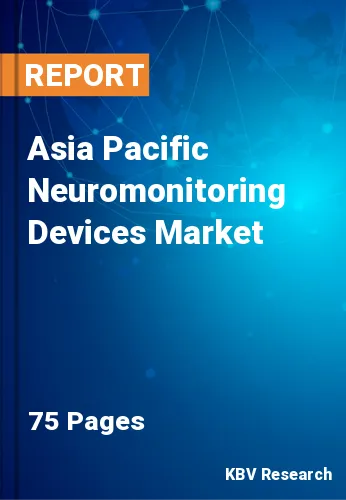The Asia Pacific Neuromonitoring Devices Market would witness market growth of 7.9% CAGR during the forecast period (2022-2028).
Sharp probing and direct observation to ensure a safe path across the working tunnel to the disc space, EMG stimulation is used. The posterior edge of the discectomy is then created by inserting a shim down the posterior blade and tapping it into the disc space under fluoroscopic and visual supervision. After seeing the ALL and retracting any remaining muscle tissue anteriorly, a tiny retractor is placed between the craniocaudal blades. It is then gently moved along the anterior boundary of the ALL, which is verified by fluoroscopic imaging.
Entirety, as well as the anterior visceral and vascular structures, are protected by this tool, which is fastened to the index retractor and acts as the anterior border of the safe operation field. The segmental arteries, which are direct offshoots of the aorta and can cause considerable hemorrhage if torn, as well as the psoas muscle and neurological tissues, are all at risk of injury from severe retractor separation and toeing of the blades.
A sizable number of developments are now taking place in this region. Several developing nations, including China and India, are located in this region. To provide their residents with better care, governments in these nations are increasing the amount of money they invest in building out their healthcare infrastructure. Additionally, the region's population's per capita disposable income is rising, which enables them to buy a range of pricey and incredibly evolved treatment modalities.
Since the prevalence of neurological diseases is on the rise in Asia Pacific, as is the advancement of neuromonitoring technology, the region's neuromodulation market is growing. Among the most prevalent neurological disorders, depression affects people of all ages. The majority of people suffering from depression in developing countries is poor and stressed financially because of various socioeconomic factors. Dystonia, Parkinson's disease, and obsessive-compulsive disorder are a few additional neurological conditions that are frequently observed in elderly adults.
The China market dominated the Asia Pacific Neuromonitoring Devices Market by Country in 2021, and would continue to be a dominant market till 2028; thereby, achieving a market value of $652.4 million by 2028.The Japan market is poised to grow at a CAGR of 7.2% during (2022 - 2028). Additionally, The India market would display a CAGR of 8.6% during (2022 - 2028).
Based on Product, the market is segmented into Doppler Ultrasound, EEG, Fetal/Neonatal Neuro-Monitoring Devices, Intracranial Pressure Monitoring, Cerebral Ox meter, Near Infrared Spectroscopy, Speckle Imaging, Micro Ultrasound, and Others. Based on End User, the market is segmented into Government, Energy, Defense, Agriculture & Forestry, Media & Entertainment, Civil Engineering & Archaeology, and Others. Based on countries, the market is segmented into China, Japan, India, South Korea, Singapore, Malaysia, and Rest of Asia Pacific.
Free Valuable Insights: The Worldwide Neuromonitoring Devices Market is Projected to reach USD 8.2 Billion by 2028, at a CAGR of 7.3%
The market research report covers the analysis of key stake holders of the market. Key companies profiled in the report include General Electric (GE) Co. (GE Healthcare), Koninklijke Philips N.V., Medtronic PLC, Nihon Kohden Corporation, Natus Medical Incorporated, Nuvasive, Inc., Advanced Brain Monitoring, Inc., Intranerve Neuroscience Holdings, Llc, Specialtycare, and RIMED Ltd.
By Product
By Country
Our team of dedicated experts can provide you with attractive expansion opportunities for your business.

